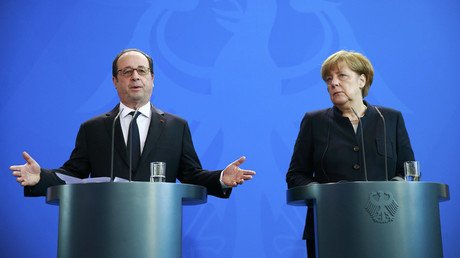US under Trump among external threats to EU – council president Tusk
European Council President Donald Tusk has called the US under President Donald Trump one of the external threats to the EU along with China, Russia and radical Islam.
The senior EU official added that the bloc must take “spectacular steps” to avoid disintegration. He said that if this did not happen, separated European nations would become dependent on the US, China and Russia.
Tusk said the EU could capitalize on Trump’s trade strategy to boost European economic ties around the world.
LIVE press conference in Tallinn with @ratasjuri, @MarisKucinskis, & @SkvernelisLthttps://t.co/R2pAIRqkK6
— Donald Tusk (@eucopresident) January 31, 2017
The remarks were made in the Estonian capital, Tallinn, where Tusk was meeting leaders of the three Baltic states. His speech mirrored an open letter to European leaders he had written earlier, ahead of a summit in Malta on Friday.
Tusk believes that the EU is currently facing a threat unprecedented since the since the signature of the Treaty of Rome in 1957, which founded the European Economic Community, EU’s predecessor.
“For the first time in our history, in an increasingly multipolar external world, so many are becoming openly anti-European, or Euroskeptic at best. Particularly the change in Washington puts the European Union in a difficult situation; with the new administration seeming to put into question the last 70 years of American foreign policy,” he said in the letter.
Tusk said that in addition to external threats, the EU has to deal with domestic nationalism, “national egoism,” a “decline of faith in political integration” and rising doubts about “the fundamental values of liberal democracy.”
Tusk warned against seeing any potential end of the EU as a positive development.
“The disintegration of the European Union will not lead to the restoration of some mythical, full sovereignty of its member states, but to their real and factual dependence on the great superpowers: the United States, Russia and China,” Tusk wrote to EU leaders. “Only together can we be fully independent.”
The European Council president suggested that the EU should borrow the American motto: “United we stand, divided we fall.” Variations of the phase have been used since antiquity, although its American roots date back to a pre-Revolutionary song by John Dickinson, one of the Founding Fathers.
While Tusk’s criticism of Trump is among the most vocal by EU officials since the Republican’s election, he is far from being alone. Earlier, Guy Verhofstadt, the EU’s chief negotiator on Brexit, said Trump and his chief strategist, Steve Bannon, are determined to break up the European Union.
Verhofstadt identified three major threats to the EU, with radical Islam and Russia being the first two.
“My impression is we have a third front undermining the EU, and that is Donald Trump, who ... has spoken very favorably that other countries will want to break away from the EU, and that he hoped for a disintegration of the EU,” he added.













